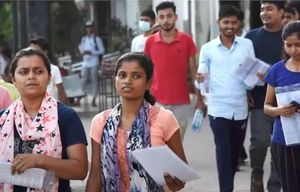On May 6, 2025, in Katowice, Polish politician Szymon Hołownia announced that legislative work is underway on a significant bill aimed at banning smartphones in primary schools across the nation. This initiative, he emphasized, is not contingent on the outcome of the upcoming presidential elections, showcasing his commitment to addressing the pressing issue of children's mental health in the context of digital technology.
During a press conference, Hołownia articulated the necessity of this ban, stating, "I will continue to fight hard for a ban on smartphones in primary schools. This ban must, of course, be implemented alongside educational tools, such as training for expectant parents, combined with a day off for digital hygiene, so that we know when we can give our children a story on Netflix, when they can watch YouTube, and when they can have social media." His words reflect a growing concern among parents and educators about the impact of excessive smartphone use on children's development.
Hołownia pointed out that the current lack of a systematic approach to managing smartphone use among children has led to serious health and social consequences. To combat these issues, he announced plans to establish a National Institute of Digital Hygiene, which would focus on educating families and preventing unhealthy technology habits. This institute aims to provide resources and support for parents and educators to navigate the complexities of digital media.
Moreover, the proposed bill will take into account the needs of students with special requirements. Hołownia acknowledged that for some children, smartphones serve therapeutic purposes or help in emotional regulation. He stated, "The needs of children who have psychological special needs, for example, have scripts or heuristics on their smartphones that allow them to calm down. This must be ensured." This consideration highlights the importance of inclusivity in technology policies affecting children.
In his critique of the current educational policies, Hołownia expressed dissatisfaction with the Ministry of National Education's (MEN) approach, which allows decisions regarding smartphone restrictions to be made by pedagogical councils and student governments. He argued that this decentralized decision-making is insufficient, asserting, "Minister (of Education, Barbara) Nowacka has repeatedly expressed a different opinion than mine regarding this matter. I believe she is wrong." His remarks underline the urgency he feels regarding the need for a cohesive national policy.
Despite the political uncertainties surrounding the upcoming elections, Hołownia affirmed his resolve to push forward with the legislation. He declared, "Regardless of whether I become president, I will gladly sign it. If I become the Speaker of the Sejm or simply a member of parliament, I will still vote for this bill, I will still submit this project, and I will still fight for it." This steadfast commitment reflects his understanding of the growing public support for such measures, especially among parents and educators concerned about the digital landscape's effects on children.
Research indicates that the psychological and social implications of smartphone use among children are increasingly alarming. Studies have shown that excessive screen time can lead to issues such as anxiety, depression, and social isolation. As a result, Hołownia's proposal resonates with a broader movement advocating for healthier digital practices in educational settings.
Furthermore, the bill's introduction aligns with a global trend where various countries are reevaluating the role of technology in education. Some nations have already implemented similar bans, recognizing the potential benefits of reducing screen time for young learners. As Hołownia's initiative gains traction, it may inspire other regions to consider similar legislative measures.
In conclusion, Szymon Hołownia's announcement of a nationwide ban on smartphones in primary schools represents a significant step toward addressing the mental and social health challenges posed by digital technology. His commitment to creating a National Institute of Digital Hygiene and ensuring that the needs of all children, including those with special requirements, are met, reflects a comprehensive approach to this pressing issue. As the legislative process unfolds, it will be crucial to monitor public response and the potential impact of such a ban on the educational landscape in Poland.




